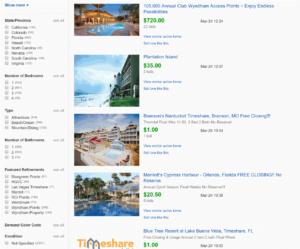As I mentioned, I’m writing this from Las Vegas, the place where everyone goes in order to embody the experience of YOLO.
It’s a dizzying place, with everything designed to disorient you. And hey, since you can’t seem to find the exit door, look at this shiny slot machine! It’s only 5 cents to play! (But you can play 99 times at once to increase your chance at winning!)
In an endless quest to orient myself, I’ve repeatedly asked people with official looking nametags how to get somewhere. They may know, or they may not, but a disproportionate number of them finish their response with an automatic “so how long are you here in Vegas?”
I don’t think they’re asking about either my well-being or my travel plans, so “uh, thanks, gotta go,” is my knee jerk response, the same way I avoid the people on the street corner who say “Hey man, can I ask you something? You look like you’re a person who cares about the environment…”
My partner pointed out to me that the nametags we were seeing weren’t for the casino, but for a different company: a timeshare company.
If this doesn’t give you the fear, it should.
Table of Contents
What exactly are we sharing here?
A timeshare, in the public understanding, is a fractional (time-based) ownership of a property. Historically it used to be a fixed date per year (the second week in November, say) at a fixed property, but advances in technology and the industry mean that there are options for flexibility, such as the ability to “exchange” your week for another week, or to forgo “weeks” entirely, and instead pay into a points system, not unlike frequent flyer miles.
(The difference between frequent flyer miles and timeshare points, of course, is that one can sometimes be a good deal, and one is, as far as I can tell, never a good deal.)
The average timeshare purchase is around $16,000, according to MarketWatch. But this doesn’t include monthly and annual fees, which can run to thousands of dollars each year.
Stories are legendary about the hard sell. People are lured in with incredible deals: a free hotel stay, $500 cash, a trip somewhere, with the only requirement is that you watch a “short presentation”.
I have never been to one of these, so I can’t speak to how they are. I know people who have though, and I’ve heard about a punishing level of pressure to sign up, followed by the complete inability to redeem the prize, despite weeks and weeks of calling and complaining.
My limited experience with timeshares
I do have some experience with redeeming timeshare points, or trying to, as I know people who have accounts with one of the big timeshare companies, who generously allowed me to see if there was anything I could find with the points. With properties all around the world, it should be easy to find a property to redeem at. Alas, many properties have almost no availability, with a single check-in date in the next six months.
(I know people complain about frequent flyer miles being hard to redeem, but this is absurd.)
I actually did find a property once that had availability during the time that I would be in the area. However, when I looked closer, I saw that just to redeem the points (that were already bought), there was a “redemption fee” of hundreds of dollars, plus a housekeeping fee for each day of the stay.
So let’s recap: with the system, you buy into a system where you need to pay fees each year for maintenance, then pay again to redeem access to the properties you already own.
No wonder they’re offering cash prizes at the door.
Remember one of the golden rules: if they are actively selling something, it’s a clear sign that the product doesn’t sell itself. And that’s probably for a reason. But here’s another rule: if they try to distract and misdirect you with free perks in order to sell something to you, that’s a sure sign that what they’re selling isn’t a good deal.
I mean, if it were a good deal, we would be seeking them out, wouldn’t we?
Look up timeshares for yourself
But, as LeVar Burton would say, you don’t have to take my word for it.
Do a Google Search for timeshare. This is what came up for me:

Note that I didn’t type in “get out of timeshare”, just the word “timeshare”.
It turns out that you need to go to the fourth non-ad listing to see an actual timeshare vendor. Companies reselling timeshares beat them out.
But reselling a timeshare you’ve bought is problematic too. It turns out that a timeshare, in many cases, isn’t worth much of anything on the secondary market.
Don’t believe me? Check out eBay:

I did a search for “timeshare” and checked “sold listings”. This is what these sold for. Almost none of them brought in any more than $1,000.
Just walk away
To be honest, I don’t actually expect you to purchase a timeshare, or be interested in one.
But you might be tempted by the perks promised to you just for going to the presentation.
Don’t bother. Save your time. You probably won’t get the perks, and even if you do, it won’t be worth it.
And when those people ask you “How long are you staying here?” just thank them and walk away. Misdirection can work both ways, you know.
But enough about me. Do you know anyone with a positive timeshare experience? I’d love to hear.


